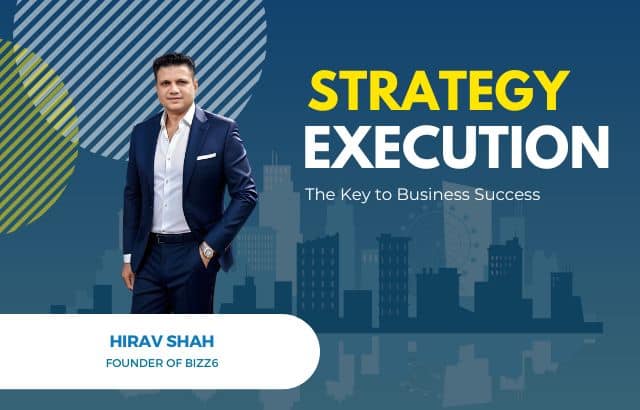In today’s fast-paced world, businesses must be prepared for tomorrow’s challenges, not just today’s. With rapid advancements in technology, shifting market dynamics, and evolving consumer behaviors, companies need to stay ahead of the curve. The key to thriving in this environment lies in strategic planning and effective execution.
As a Business Strategist, Founder of Bizz6, and author of 18 strategy books, Hirav Shah has empowered businesses across various industries with his insights on building long-term success. His strategies revolve around understanding both the broader vision and the detailed steps required to make that vision a reality.
Here, we explore some of Hirav Shah’s most valuable insights on overcoming challenges and securing business success.
Table of Contents
Embracing Strategy and Execution: Frequently Asked Questions (FAQs)

Q1: Why is strategic planning crucial for businesses?
A1: Strategic planning is essential because it helps businesses to navigate through uncertainties. A well-thought-out strategy helps companies align their resources, make informed decisions, and stay focused on long-term goals even in times of change.
Q2: How can businesses prepare for future challenges?
A2: Businesses must be proactive in identifying potential disruptions and preparing for them. This includes investing in technology, staying updated on industry trends, and constantly re-evaluating business models to remain adaptable.
Q3: What role does leadership play in overcoming business challenges?
A3: Strong leadership is the cornerstone of navigating challenges. Effective leaders inspire their teams, communicate clear visions, and foster a culture of innovation and collaboration, which are essential for overcoming obstacles.
Q4: How do you measure the success of a business strategy?
A4: Success can be measured by setting clear, achievable goals and regularly assessing progress through key performance indicators (KPIs). Continuous feedback, data-driven decisions, and refining the strategy over time are critical to long-term success.
Q5: Can a small business implement big business strategies?
A5: Absolutely. Even small businesses can implement big strategies. The key is to tailor the strategy to the business’s scale and resources while ensuring it is flexible and adaptable. Big strategies can help small businesses grow by fostering innovation and enabling them to differentiate themselves in the market.
5 Inspiring Quotes from Hirav Shah

“Strategy is not about being better than the competition; it’s about being better than you were yesterday.”
Explanation: This quote emphasizes continuous self-improvement. In business, focusing on your own progress rather than obsessing over the competition can lead to sustainable growth and success.
Strategy:
Continuous improvement, leveraging internal strengths, and learning from past experiences are key to creating an effective business strategy.
Execution:
Implementing a strategy of incremental improvements means consistently refining operations, products, and services to stay ahead in the market.
“The future of business lies in its ability to adapt faster than change itself.”
Explanation: Businesses that are flexible and quick to adapt are the ones that will thrive. Being able to adjust to market changes, new technologies, and evolving customer needs is crucial.
Strategy:
Develop agile strategies that can quickly pivot when required, and focus on building a culture of innovation and adaptability.
Execution:
Foster an environment where experimentation is encouraged and quick decisions are made to capitalize on new opportunities or adjust strategies as needed.
“A business strategy is only as good as its ability to solve real problems.”
Explanation: A strategy should be centered around solving pain points or unmet needs in the market. This ensures that your business remains relevant and provides value to its customers.
Strategy:
Focus on identifying customer pain points and aligning your business objectives around solving them to drive meaningful results.
Execution:
Ensure your team is aligned with the strategy of addressing key customer challenges through focused product development, marketing, and customer service.
“Execution without strategy is like building a house without a blueprint.”
Explanation: Without a clear strategy, execution can be aimless, resulting in inefficiencies and wasted resources. A well-thought-out strategy provides direction and ensures that efforts are aligned with the desired outcomes.
Strategy:
Create a comprehensive strategy that includes well-defined goals, actionable steps, and milestones to guide your execution.
Execution:
Translate strategy into action by ensuring that all team members understand their roles and responsibilities in implementing the plan.
“Success is not about avoiding failure; it’s about learning from failure and staying the course.”
Explanation: Failure is inevitable, but how businesses respond to it makes all the difference. Embracing failure as an opportunity for learning fosters resilience and paves the way for future success.
Strategy:
Develop a strategy that encourages innovation, risk-taking, and learning from mistakes, rather than avoiding failure at all costs.
Execution:
Promote a culture where failure is viewed as a stepping stone, and continuously refine strategies based on lessons learned from previous efforts.
Embracing Strategy and Execution for Tomorrow’s Success











